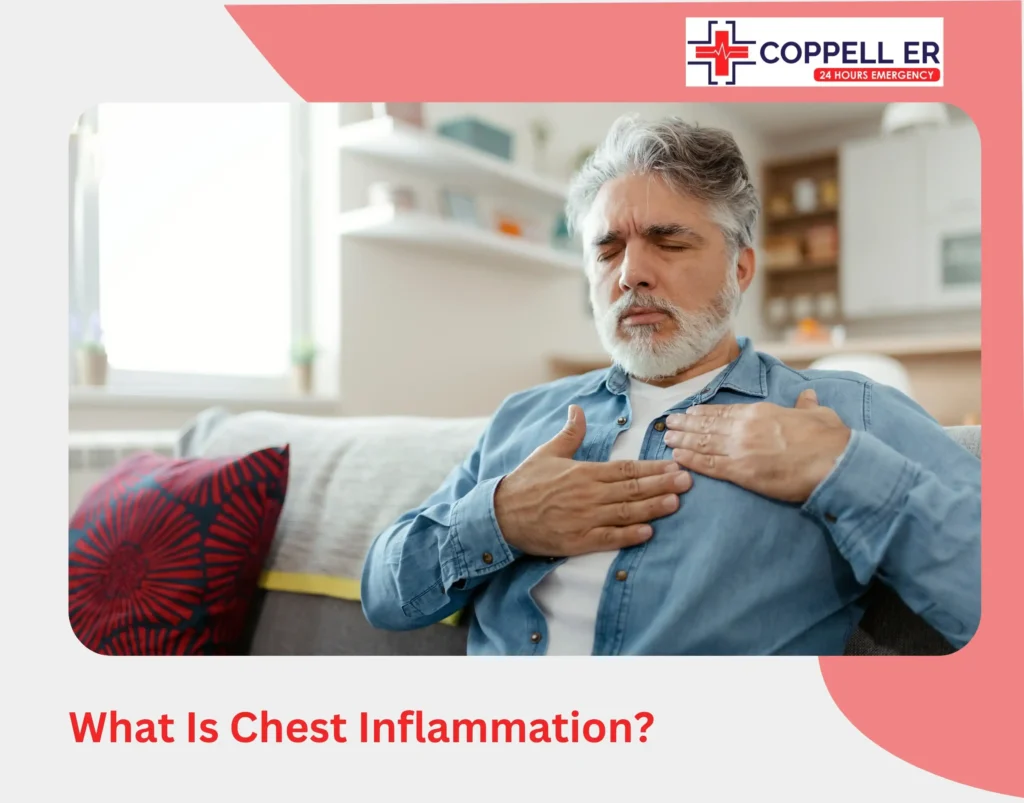Chest inflammation becomes dangerous when it restricts breathing or affects heart function, which can happen within hours of symptom onset. While most chest inflammation stems from minor muscle strain or viral infections, certain types can rapidly progress to life-threatening complications.
Several conditions cause inflammation in the chest, from pleurisy and muscle injury to costochondritis and pneumonia. Emergency symptoms include difficulty breathing, rapid heart rate, fever above 101°F, or pain that worsens despite rest. Let’s examine each condition and identify when chest inflammation requires emergency treatment.
What Is Chest Inflammation?

Chest inflammation refers to the irritation or swelling of the inner lining of your chest. This can affect the muscles, ribs, or the thin layers around your lungs and heart. It often causes pain, tightness, or a burning feeling when you breathe, move, or cough.
Unlike typical muscle soreness, chest inflammation often worsens with breathing or movement. The pain may start as mild pressure but can escalate to sharp, stabbing sensations that radiate to your back or arms.
Since chest inflammation can sometimes mimic heart attack symptoms, distinguishing between normal chest pain and heart attack becomes essential for proper emergency response.
Key Symptoms of Chest Inflammation to Watch For
Inflammation in the chest can manifest differently for each person. Some people have mild discomfort, while others may feel sharp and sudden pain. Here’s what to look out for:
Mild to Moderate Symptoms
These symptoms might not need emergency care, but should still be checked by a doctor:
- Soreness or tightness in the chest
- Pain that gets worse when you move, cough, or breathe deeply
- Mild shortness of breath
- Dry cough
- Feeling tired or weak
Emergency Symptoms
These symptoms could be signs of a serious problem. Go to the emergency room right away if you notice:
- Sudden, sharp chest pain
- Pain that spreads to your arm, jaw, neck, or back
- Trouble breathing or feeling like you can’t catch your breath
- Dizziness or fainting
- A fast or irregular heartbeat
- Chest pain with high fever or chills
Common Causes of Inflammation in the Chest
Chest inflammation can originate from various sources. Some causes are mild and resolve with rest, while others may require medical attention. Knowing what’s behind your chest pain can help you take the proper steps toward treatment and recovery.
1. Infections
Viruses or bacteria can cause inflammation in the chest, especially around the lungs. This often occurs with conditions such as the flu, bronchitis, or pneumonia. The pain may feel worse when you cough or breathe deeply.
2. Muscle Strain
Overusing your chest muscles, like during heavy lifting, intense workouts, or even repeated coughing, can lead to chest pain. This type of pain typically feels sore or tight and worsens with movement.
3. Chest Injury
A fall, a car accident, or a direct hit to the chest can bruise or damage the tissues inside. Even if nothing is broken, the body’s response to the injury can cause swelling and pain in the area.
4. Costochondritis (Inflammation of Cartilages)
Costochondritis occurs when the cartilage where your ribs connect to your breastbone becomes swollen. It can cause sharp, stabbing pain that often gets mistaken for a heart problem. It usually worsens when you press on the chest or move.
5. Autoimmune Diseases
Conditions like rheumatoid arthritis or lupus can make the immune system attack healthy tissues. When this condition affects the chest or joints around the ribs, it can lead to inflammation and pain, even in the absence of an injury or infection.
How the ER Diagnoses and Treats Chest Inflammation

When you come to the ER with chest pain or inflammation, the medical team will work quickly to identify chest inflammation causes and rule out life-threatening conditions within the first 15 minutes of your arrival.
What to Expect During Diagnosis:
- Questions about your symptoms: When the pain started, how it feels, and what makes it better or worse
- Physical exam: A physician may press on your chest, listen to your breathing, and check your heart rate
- Chest X-ray: Onsite digital x-rays help detect infections, fluid, or injuries within the chest
- Electrocardiogram (ECG): A quick echo scan checks your heart’s electrical activity to rule out a heart attack
- Blood tests: Our onsite lab identifies infection markers, inflammatory indicators, and cardiac enzymes within minutes
- Other scans (if needed): Sometimes a CT scan or ultrasound is used for a clearer view
Treatment Options for Inflammation in the Chest
Treatment depends on the specific cause and severity of inflammation in the chest:
- Pain relief: Medications to alleviate chest pain and reduce swelling
- Oxygen therapy: If you’re experiencing difficulty breathing, you may receive additional oxygen
- Antibiotics: If the cause is a bacterial infection
- Anti-inflammatory drugs: To reduce swelling caused by injury or conditions such as costochondritis
- Observation: Monitor patients with concerning symptoms before discharge or transfer
- Specialist coordination: Arrange transfer to facilities with specialized cardiac or pulmonary services when needed
- Hospital transfer: If symptoms are severe or need close monitoring
When to Seek Emergency Care for Chest Inflammation

Chest inflammation becomes a medical emergency when breathing becomes difficult, pain intensifies rapidly, or symptoms include high fever, dizziness, or rapid heart rate. Emergency evaluation provides the fastest path to accurate diagnosis and appropriate treatment.
If your chest pain feels severe or doesn’t go away, don’t wait. Visit the ER and let a medical team check it out. Early intervention can prevent minor inflammation from developing into serious complications.
Frequently Asked Questions
1. Is all chest pain a sign of a heart attack?
No, not always. Chest pain can result from various causes, including muscle strain, inflammation, or infection. But because heart problems can feel similar, it’s safest to go to the ER if the pain is sudden, severe, or doesn’t go away.
2. Can chest inflammation go away on its own?
Mild cases caused by muscle strain or a minor infection may improve with rest, fluids, and over-the-counter pain relief. However, if symptoms persist for more than a few days or worsen, consult a doctor to rule out any serious underlying conditions.
3. How do I know if my chest pain is serious?
If your chest pain is sharp, spreads to other parts of your body, causes shortness of breath, or comes with dizziness or sweating, go to the ER immediately. It’s better to be safe and get checked.
4. Can stress or anxiety cause chest inflammation?
Stress and anxiety don’t usually cause inflammation, but they can lead to chest tightness or pain that feels similar. Still, never assume it’s just anxiety. Always get chest pain checked to rule out other causes first.




